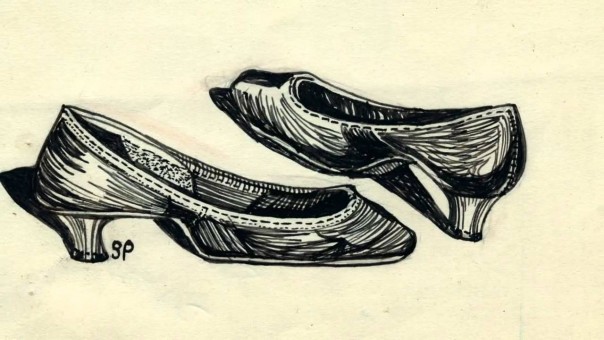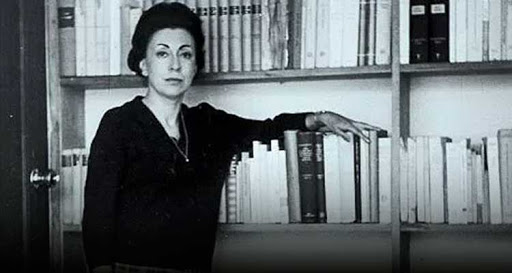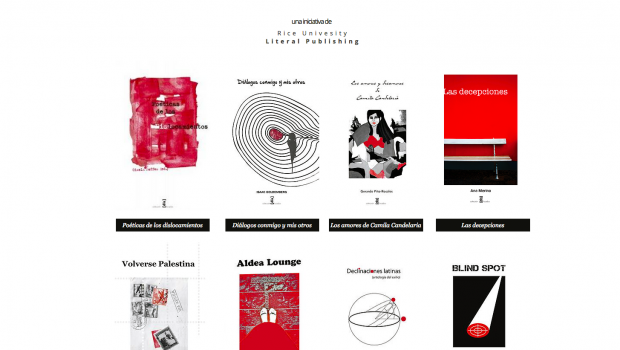Ghosting on the Río Grande
Dini Karasik
Lupita stands at the stove stirring a pot. She’s wearing a white Playtex bra, a terry cloth robe, and grey polyester pants with an elastic waistband. Her skin is clammy. The space heater is on high and she’s still warm from ironing clothes in the back room where the windows are all nailed shut to keep out the mojados who cross the river and sometimes steal from her. A garden hose. Laundry on the clothesline. Fruit from the lime and fig trees. She can’t prove it, of course, but all she needs is for them to break in and take her inventory of used clothes, which is basically like robbing her of all her money.
On her feet are a pair of Dr. Scholl’s she found at the bottom of a barrel at the Ropa Usada. They still had the tags on them and even though they are a size too small, she bought them. They only cost a dollar. She had planned to resell them, at least for four dollars, but when she tried them on, they didn’t hurt too bad. They are the wooden ones with a single strap and buckle that fits over the top of the foot. The strap pinches the bunions on the sides of her feet but she figures they’re leather and they’ll stretch.
Lupita places three sticks of cinnamon into the boiling water and moves the pot to another burner. Té de canela. Cheap and flavorful. It makes the house smell like Christmas, which she hasn’t celebrated since the fire sixteen years ago that took Joe and the girls. She heats a flour tortilla on the open flame of the stove and then another, charring them a little and scraping off the black flakes before placing them on a small, plastic plate. She pours the tea into a cup and stirs in a tablespoon of sugar. Of the four chairs at the table, only one sits flush with the floor. She chooses it, scraping its metal feet across the linoleum and sitting down to slather butter on each of the tortillas. When she bites into one, butter dribbles down her chin. She wipes it away with the sleeve of her robe.
She finishes getting dressed, choosing a thin, dark sweater from a tall stack of clothes leaning against the dresser in her bedroom. A column of women’s capris neatly folded from light to dark obscures her view of the full-length mirror hanging on one wall, so she puts them on the bed in neat rows in order to get a good look at herself. The sweater hugs the rolls of fat around her middle but she decides to wear it anyway.
Down the hall, she arranges a new pile of infants’ clothes on top of a mound of dresses and jumpers and pajamas in the second bedroom. There is a small closet full of baby blankets: fleece, crochet, macramé. There are crib sheets. Hundreds of them. Some crisp and new, others the color of dishwater. The edge of a twin bed peeks out beneath a heap of tiny shoes. A chair, a nightstand, and a bookshelf without books are buried beneath the hoard like lost artifacts. The room smells faintly sweet; clothes cling to their aromas, even years later. Lupita takes a deep breath. With one foot, she kicks aside a bundle of cotton swaddles that have fallen to the floor and turns off the light.
She gathers her purse and keys and tears several large plastic bags from a bolt she keeps at the front door. She leaves her house and sees that a storm is coming. From inside her purse, she roots out a silk scarf with a drawing of the Eiffel Tower in the center and a thick, silver border, a steal at $2.00. She ties it around her head to keep her coarse, grey hair out of her eyes.
The winds are kicking up dust from the dirt yard and disturbing tiny pebbles in the gravel driveway. It’s a good thing she changed her shoes, not that she’s crazy enough to wear sandals outside in the dead of winter. Highs in the fifties today. Freezing cold, by her standards. Keds on her feet now. No socks, though. That’s the one thing she never buys at the Ropa Usada. Well, socks and underwear. Bras, yes. Nothing wrong with that. It’s not like she can afford to go without, not with her enormous bosom.
It’s Wednesday morning and the Ropa Usada always gets in new shipments on Wednesdays. She’s running low on winter inventory and if she doesn’t get there early, she’ll miss out on the best things: silk blouses, cashmere sweaters, wool coats and puffy jackets. Incredible what the wealthy throw away. If she stocks up now, she’ll have plenty to sell at the flea market before the days grow warmer.
Lupita eyes her rusty old Civic, her only worldly possession—aside from the nightgown she wore to bed—that wasn’t destroyed by the fire. The tire on the driver’s side looks a little low. If it doesn’t start, she’ll ask Memo next door to get his jumper cables. The bodega isn’t far. Just a mile down the road. She’ll deal with the tire later.
The jumbo garbage bags she carries under one arm flap like black flags in the wind. She wrestles with them as she forces them into the hatchback. The hinges groan when she finally slams the door shut.
She prefers the summer storms that roil out of the sky after a long, hot day, dropping rain and cooling the sun-baked streets. She swears she can hear sizzle when those first droplets hit the ground. But on days like today when the sun hasn’t once broken through the cloud cover and the world seems to be missing its shadows, it seems as though summer will never come. She thinks of her twins, Perla and Paloma, who on sunny days sat on the front stoop, criss-cross apple sauce, opposite one another, casting shadows, one a mirror image of the other. Seeing the flat, grey world around her only reminds her that they’re gone.
She gets in the car, puts her purse in the passenger seat, and arranges a thick phonebook and two small pillows underneath her. It’s the only way she can see over the steering wheel. The engine starts after a few tries and she puts the car in drive.
The streets are empty. At least compared to how they used to be when people would come from across the river to buy things from her. That’s when she had the stall at the downtown mercado, which closed years ago, along with the Woolworth’s, the Hotel Hidalgo, the Plaza Cinema. Now the place is a ghost town. She makes half as much selling clothes at the flea market as she did at the mercado, and now she has to compete with the viejas who come from across and buy up all the clothes in bulk, sight unseen, and take it back to Mexico to sell in the streets at a fraction of what she charges. Her most loyal customers won’t cross the bridge anymore. There’s always an excuse: the cartels, the Border Patrol, too few pesos. It’s no wonder her house is full of inventory. Still, she could use more.
She rounds the corner to the Ropa Usada and parks at a broken meter. She’d park in the garage two blocks down, but the car doesn’t go in reverse anymore and she can only parallel park. That she found this spot is Joe’s doing, she’s certain. He knows her back has started to ache, that it’s not so easy for her to drag bags full of clothes to the car. A close parking spot is his way of looking out for her. His messages don’t come often but when they do they are almost always helpful.
Every now and then he sends her more personal messages. Like when she was at the H.E.B. recently trying to decide between bistec and chicken and one of his favorite songs came on, the one that goes “I’ll light the fire, you place the flowers in the vase that you bought today…” She knows that’s him saying, “Buy the bistec, amor. You know that’s my favorite.” Or when she’s driving and “Oh Sherrie” by Steve Perry comes on the radio. When she first met Joe, it was popular. It hardly ever comes on the radio anymore, but when it does, Lupita knows right away that Joe is sending her a message, reminding her that he loves her. It’s early yet and she knows she’ll have to wait for the Ropa Usada to unlock its doors. When she doesn’t get there in time, she misses out. It happened to her last week when she overslept and arrived mid-morning. Nothing was left but miscellaneous linens and summer clothes—shorts, blouses, spaghetti-strap dresses. Though, she’ll often buy off-season if she finds something that would’ve looked nice on the twins. Denim shorts. Swimsuits and exercise clothes. Once, she found two wedding dresses, not the same but similar enough had they wanted a double wedding. They would be in their mid-twenties by now, probably with children of their own, so the clothes in the second bedroom are really for the grandchildren she imagines. These clothes are not for sale. The living room, dining room, hallways, and master bedroom are where she stores current inventory, and right now she needs to stock up on men’s slacks and overcoats.
Lupita thinks she sees movement in the back of the bodega. She taps on the glass with her car keys. It must be close to 9:00 a.m. There’s no answer. She walks to the end of the row of abandoned store fronts, clutching her plastic bags, and squints as she looks down the road at the bank clock. She can just make it out. It reads 8:50 a.m. and she wonders if the owner is running late. She heads back to the storefront and stands beneath its tattered awning as the first raindrops begin to fall.
It rained a slow and steady downpour the last night she and Joe spent together, sitting in the kitchen, conspiring to surprise the twins. It was drafty, cold, and they left the stovetop burners on to warm up as they settled on their plans. They had saved enough and would drive to California for Christmas, take the girls to Disneylandia, visit all the primos in East Los where she was born and raised. They turned out the lights, went to bed, kissed each other goodnight.
That Christmas, all the relatives wound up coming to Texas instead, to attend the funerals, to help her get back on her feet—which took years, not days. No one realized how long it would take for her to recover from the shock, for the insurance money to come through, for Joe’s police pension to kick in. One by one, they all went home.
They still call or send Hallmark cards on holidays, but no one comes to visit. Lupita doesn’t mind. It’s easier this way. There’s really no place for anyone to sleep anyway. The rooms are all full, stacked floor to ceiling with supply. And they would just try to talk her into getting rid of everything. They don’t realize how much money she stands to make. She has some real treasures, too. Silk dresses and vintage coats. Mens’ dress shirts and three-piece suits. Sweaters of all styles in a variety of fabrics: wool, mohair, alpaca. Crocheted scarves and French berets, which sell like hot cakes in the winter months.
She raps on the door again. Nothing. It’s coming on 9 a.m. Then it finally hits her that no one else is waiting to get in. Normally by now there’s a line of people with empty suitcases and shopping bags waiting to get in. She looks up and down the street. Not a soul. Then she hears the sound of church bells. It takes her a moment but she remembers: It’s Christmas Day.
After the fire, the church raised some money to buy her food and clothes, but the funds to rebuild the house came from the insurance company after a lawyer helped her file the right papers. Juan J. Cielo, Esq., that was his name. She saw it as a sign: Cielo. Sky. Heaven. That was the first time Joe pointed her in the right direction. Why hadn’t he signaled that the store was closed today?
She gets in her car and drives home. There’s no traffic, of course, because it’s Christmas. How could she have forgotten? The rain is coming down hard when she parks. She finds an old newspaper in the backseat, covers her head, and walks as fast as she can back to the house. Once inside, she peels off her wet sweater and leaves the soaked Keds by the front door. The room is dark, the windows blocked by mounds of clothes. The lightbulb in the overhead fixture burned out long ago and she can’t quite get to it to put in a new one. She pulls a long-sleeved shirt from one of the piles and puts it on. It’s faded pink and has small lettering on it. She moves to the kitchen where she can see and tugs at the front of the shirt to read what it says. Life is Good. She smiles. Joe again. Reminding her to take it easy, the store will be open tomorrow.
 Dini Karasik is a Mexican-American writer whose work has appeared in an array of magazines. She the founding editor of Origins Literary Journal. Her latest short story, “Ghosting on the Rio Grande,” is forthcoming in Abundant Grace, the 7th volume in the Paycock Press series of anthologies of fiction. She is also the recipient of a 2016 Arts and Humanities of Montgomery County individual artist award.
Dini Karasik is a Mexican-American writer whose work has appeared in an array of magazines. She the founding editor of Origins Literary Journal. Her latest short story, “Ghosting on the Rio Grande,” is forthcoming in Abundant Grace, the 7th volume in the Paycock Press series of anthologies of fiction. She is also the recipient of a 2016 Arts and Humanities of Montgomery County individual artist award.Posted: July 7, 2015 at 9:01 pm










